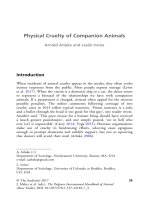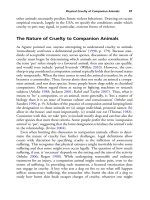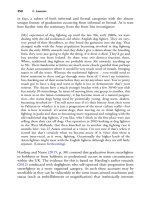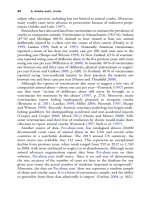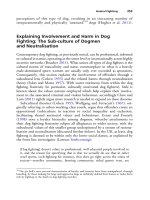The palgrave international handbook of a 157
Bạn đang xem bản rút gọn của tài liệu. Xem và tải ngay bản đầy đủ của tài liệu tại đây (26.76 KB, 1 trang )
148
J. Maher et al.
are designed in part to improve the standard of socialisation and, therefore,
future (dog) behaviours. It is perhaps too early to determine the effect of new
dog control measures within the Anti-social Behaviour, Crime and Policing
Act (2014). Whilst its extension to cover private property and the increase in
penalties for attacks on assistance dogs have been welcomed by the
Communication Workers Union and Guide Dogs for the Blind
Association respectively,14 substantial trepidation exists elsewhere regarding
the Act’s preventative versus retributive nature and also the potential for
innocent dogs and owners to get caught up in the new controls (RSPCA
2014). Rather than seeking to tackle the conditions in society that are leading
to issues such as status dog ownership, these new measures apply to all dog
owners. Dogs can be banned from certain public spaces or muzzled when not
in the home; however, there is no requirement for the enforcer to seek
behavioural or animal welfare knowledge or expertise when executing such
controls. The danger may be that any early indications of aggressive behaviour, for which these restraints were intended to cure or control, could
instead be exacerbated and this could lead to more, not less, dog attacks. The
inclusion of attacks on private property, in the era of blame and litigation, is
alarming for dog owners of all breeds as it essentially requires dogs to be able
to tell the difference between ‘safe’ visitors and those who might cause harm.
Any attack on the former could ultimately now result in the dog’s destruction. Given the aforementioned lack of knowledge with regard to dog
legislation and welfare amongst status dog owners, these new measures may
well see their dogs disproportionately represented.
These new measures may also not be in force uniformly across the UK.
In addition to the devolved nature of animal welfare and control15 a
number of police forces and local authorities have expressed concern
regarding the requisite resources needed to execute associated duties,
going as far as to say they will not enact the legislation within their
jurisdiction. More local and regional disparity for dogs will arise from
additional conditions levied by increasingly risk-averse housing providers
keen to prohibit the keeping of dogs in their properties. Tenants may be
unable to find alternative accommodation and rather than become
14
and https://
www.guidedogs.org.uk/news/2014/may/new-law-protects-guide-dog-owners#.V1RiVvkrLIU
15
The DDA, as amended, is in force in all three nations within GB, with the very similar Dangerous
Dogs (Northern Ireland) Order 1991 in effect in the fourth nation of the UK. Additional dog welfare
and control measures differ, however, as this policy area is devolved to each of those four nations. The
respective administrations should be referred to for details of these.
